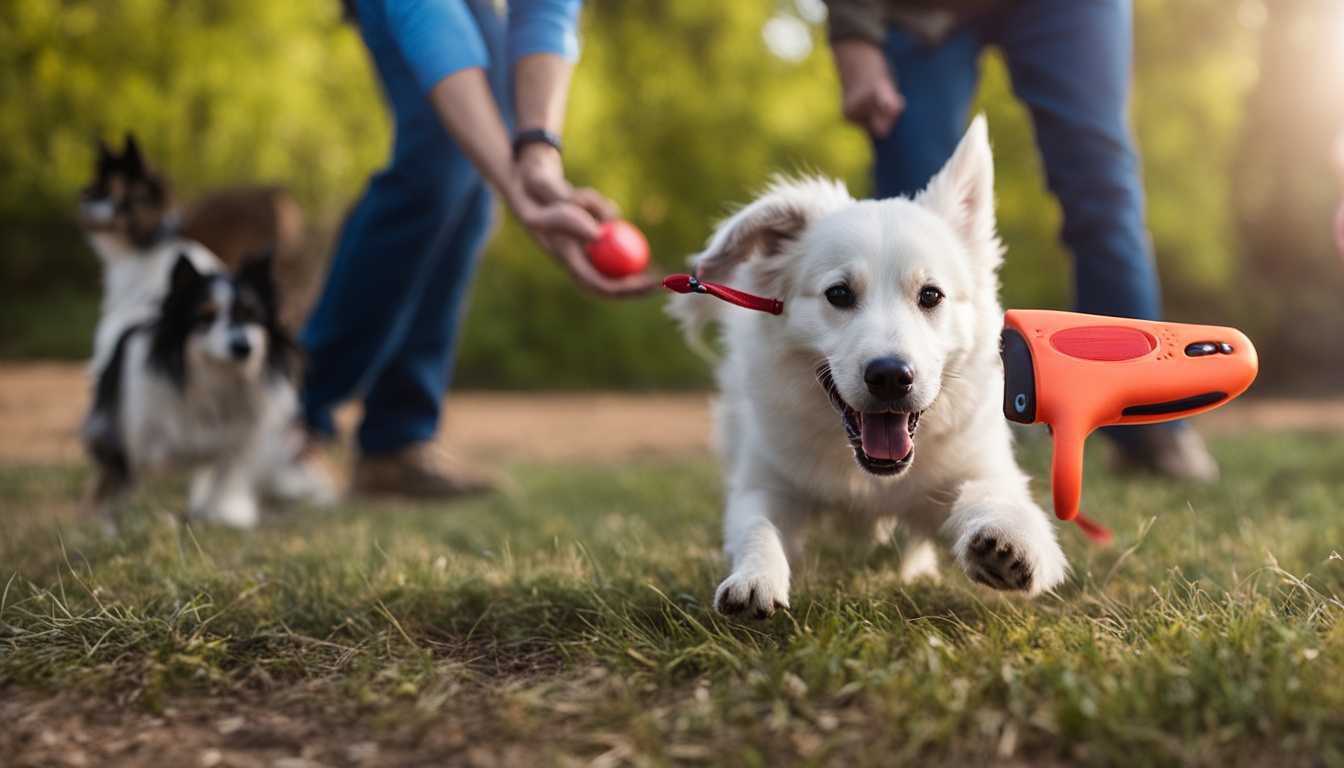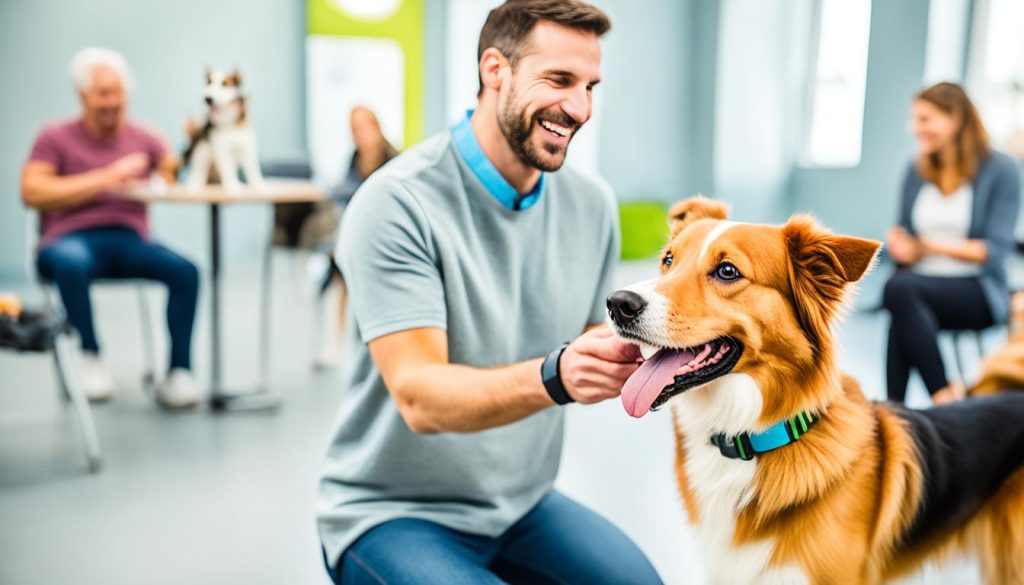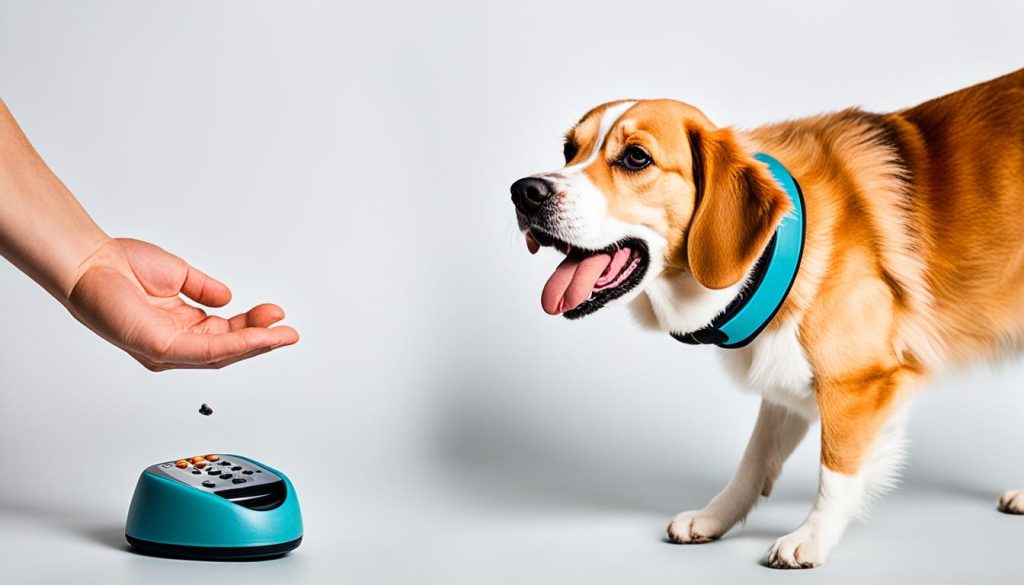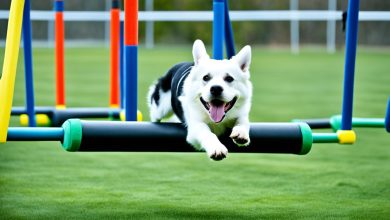Unlocking Dog Obedience with Clicker Training

Are you having trouble teaching your dog basic commands? Do you wish there was a better way to talk to your dog? Clicker training could be what you’re looking for. This method uses rewards to change dog training. It can really help your dog learn to follow commands.
Clicker training uses a device that makes a clicking sound. This sound tells your dog they did something right. When you give them a treat after the click, they learn what you want quickly. The clicker speaks to your dog in a way they get, making it a strong tool for teaching.
Key Takeaways:
- Clicker training is a reward-based method that uses a small device to signal desired behaviors to dogs.
- It is important to introduce the clicker to the puppy in a relaxed environment and familiarize them with its purpose.
- Clicker training can be used to teach various behaviors, such as heeling, fetch, release, shaking paws, and barking on command.
- Consistency, timing, and the proper use of rewards are important factors in successful clicker training.
- Clicker training offers benefits such as improved communication, increased motivation, and enhanced learning capacity for dogs.
Understanding Clicker Training and Its Evolution
Clicker training is a favorite for teaching dogs in a positive way. It has grown over the last 100 years. It uses operant conditioning principles. This method rewards dogs for good behavior instead of punishing bad ones. It makes the training experience better for both dogs and their owners.
It helps dogs and owners understand each other better. When a dog hears the clicker, it knows it did something right. This makes training clearer and helps dogs learn better.
Dogs get more excited about training with clicker training. They know the click means they get a treat. So, they try harder to do things that will get them that click and treat.
Dogs learn better with clicker training. It breaks down big tasks into smaller parts. Each part gets a click and treat. This helps dogs learn at their pace and builds their confidence.
Clicker training works for all dogs. It doesn’t matter their age, breed, or personality. It can be changed to fit what each dog needs.
With clicker training, dogs can learn many things. They can learn simple commands or even tricks. Some examples are sit, stay, come, heel, shake a paw, or roll over.
In the table below, I’ve summarized the key advantages of clicker training:
| Benefits of Clicker Training |
|---|
| Clear communication between dog and owner |
| Increased motivation in dogs |
| Enhanced learning capacity and problem-solving skills |
| Applicable to dogs of all ages, breeds, and personalities |
| Teaches basic obedience commands and advanced behaviors |
By using clicker training, owners create a strong bond with their dogs. They also teach them obedience.
The Benefits of Clicker Training for Dogs
Clicker training is great for dogs and owners. It makes communication better, boosts motivation, and helps dogs learn more.
Improved Communication
With clicker training, it’s easy to show my dog when they do something right. The click makes a sound that tells my dog they will get a treat. This way, my dog knows exactly what to do without any confusion.
Increased Motivation
The clicker tells my dog they did something good, so they know a treat is coming. It’s a way to make training fun and keep my dog interested. My dog likes learning new things because they know rewards follow.
Enhanced Learning Capacity
Clicker training makes dogs think and solve problems. They learn the commands better this way. And they enjoy figuring things out, which makes them remember better.
Clicker training helps me and my dog get along better. It builds trust and lets us understand each other more. The training sessions are fun and bring us closer.
For good clicker training, be consistent, time things right, and give rewards properly. This approach will show the best in my dog, improving their behavior. The outcome is a happy, obedient companion.
Next, I’ll give you a guide on how to clicker train your dog for great results.

Overview of Clicker Training Benefits
| Benefits | Description |
|---|---|
| Improved Communication | Clear marker for desired behaviors |
| Increased Motivation | Consistent signal of successful actions |
| Enhanced Learning Capacity | Promotes problem-solving skills |
| Positive Relationship | Creates a positive and harmonious bond |
How to Clicker Train Your Dog: A Step-By-Step Guide
Clicker training teaches dogs new behaviors with positive reinforcement. You can talk effectively with your dog and get good results by using these steps.
Introducing the Clicker
To start, show the clicker to your dog. Click the device and give your dog a treat right away. Do this many times so your dog knows the click means something good.
Remember to keep the environment relaxed and free from distractions to ensure that your dog can focus on the clicker.
Catching the Behavior
After your dog gets the click-treat link, look for behaviors to reward. Click and treat immediately when your dog does something good, like sitting. This method teaches your dog what actions are rewarded.
Shaping the Behavior
If the desired behavior doesn’t happen on its own, reward small steps towards it. To get your dog to roll over, first reward them for lying on their side, then for a partial roll, until they do the full roll.
Adding a Cue
When your dog reliably does the behavior, add a command word. Say “sit” right before your dog sits. Soon, they’ll learn that the cue means to do the action.
Practice Makes Perfect
Keep practicing with short, happy training sessions. As your dog gets better, slowly make it harder. Regularly repeat training to keep up with your dog’s learning.
Remember to keep the training sessions fun and enjoyable for both you and your dog. Incorporate play and rewards to keep your dog engaged and motivated.
Fading the Clicker
When your dog does well, use the clicker less. Start using verbal praise or petting as the main reward. This switch helps your dog listen to your commands without the clicker.

Keeping It Fun
Keep training fun to motivate your dog. Change up the training, introduce new tricks, and keep rewarding good behavior. Your dog will enjoy learning new things.
Following these steps lets you talk to your dog, shape their actions, and build a bond. This bond is based on trust and positive feedback.
Are You Using the Clicker Correctly?
Using the clicker the right way is key for clicker training. Timing is everything. Make sure to click the moment your dog does what you want. This tells your dog exactly what action got them a reward. Always click at that perfect time!
Try better treats too. While regular treats work, something tastier can push your dog to do more. Treats like Zuke’s Mini Naturals or Blue Buffalo Bits boost training results. Keep your training short and sweet. Since dogs can only focus for so little, 5-10 minute lessons work best. This keeps them interested and stops them from getting bored.
Teaching complex behaviors can be tough. But, breaking them into smaller parts helps a lot. It makes training easier to handle. Also, train where it’s quiet and calm. This helps your dog concentrate better and get less distracted.
If clicker training is tough, getting help from a pro can make a big difference. Trainers know how to tailor their advice for your dog. They can spot and overcome training hurdles, teaching you the best ways to use a clicker. If you’re stuck, don’t be shy to ask for expert help!
FAQ
What is clicker training?
How does clicker training work?
What behaviors can be taught using clicker training?
Is clicker training suitable for all dogs?
What are the benefits of clicker training for dogs?
How do I successfully clicker train my dog?
How can I use the clicker effectively?
Source Links
- https://precisiondogtrainer.com/6-tips-and-tricks-of-clicker-training-in-dogs/
- https://k9basics.com/clicker-training-101-using-sound-to-shape-dog-behavior/
- https://ruffacademywi.com/clicker-training-demystified-a-comprehensive-guide/




